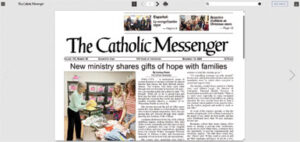By Anne Marie Amacher
The Catholic Messenger

The Iowa Alliance for Choice in Education (Iowa ACE) welcomes a new Federal Scholarship Tax Credit that it says expands educational opportunities for families and empowers students nationwide to pursue the learning environments that best meet their needs.
Iowa ACE’s Executive Director Trish Wilger said the federal income tax credit applies to individual donors supporting scholarships for K-12 students and it will help more Iowa children access the school of their choice regardless of income or zip code.
Discussion has begun among the state’s leading educational choice advocates — Iowa ACE, the 12 School Tuition Organizations (STOs) in Iowa, and Homeschool Iowa — to create an entity to facilitate the federal tax credit program in Iowa.
“The creation of the new federal income tax credit is a victory for Iowa families who want more opportunities for their children’s education,” Wilger said. “By working together to create a new organization to administer the federal tax credit program, Iowa ACE, the state’s school tuition organizations and home school leaders are reaffirming our shared commitment to making educational choice a reality for every child. We look forward to building a brighter future together.”
Wilger also shared how Iowa’s Education Savings Accounts (ESAs) fits in with the state STO program and the federal tax credit program. The 2023 law that established the ESA provides the framework and funding to support the success of every K-12 student in Iowa. Eligible families may use the ESA funds to cover tuition, fees, and other qualified education expenses at accredited nonpublic schools in Iowa. Eligibility increased to all Iowa residents for the 2025-26 academic year.
However, the “ESA doesn’t cover all the need for some families, so the existing state STO, and now a federal program, help fill that gap,” Wilger said. The federal program’s eligibility extends to “homeschool students, virtual learners, public school students — none of whom are included in the ESA or existing STO,” she added.
“The STOs are still very-much needed to help families cover costs of nonpublic education,” she continued. (Iowa STO funds collected in 2024 are distributed for the 2025-26 school year.)
She also pointed out that the qualifications to receive a tuition grant (state STO) are different from the federal program. The level of tax credit is different for the federal program. It includes additional types of learners, not just private school students.
To ease the burden on existing STOs and to make things much easier for parents to figure out, “a new Scholarship Granting Organization, as it’s called in the federal bill, could facilitate the (federal) program,” she said.
Donors to the federal program may contribute up to $1,700 per year and are eligible for a 100% federal tax credit. “The program won’t start until the 2027 tax year, so we have some time, but we hope to have our initial plans together by this fall,” Wilger said. “There will also be a rule-making process by the U.S. Treasury Department that will affect our process.”
She added, “Iowa ACE will work with federal and state officials in any capacity they find helpful to successfully implement the tax credit in Iowa.”









